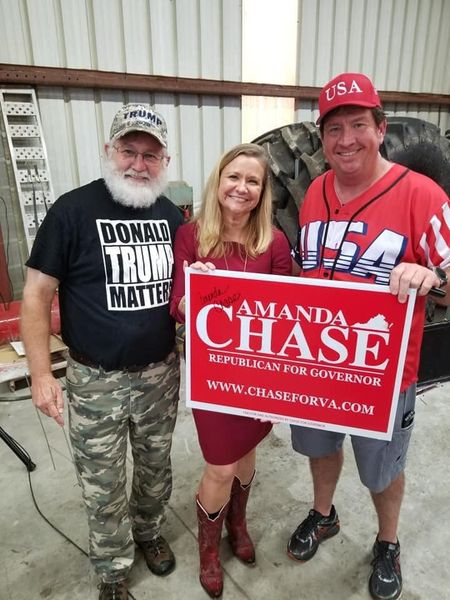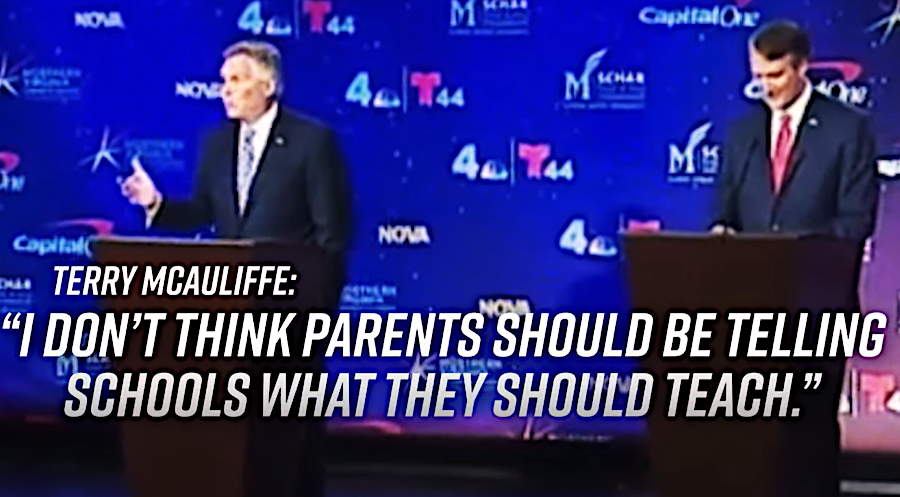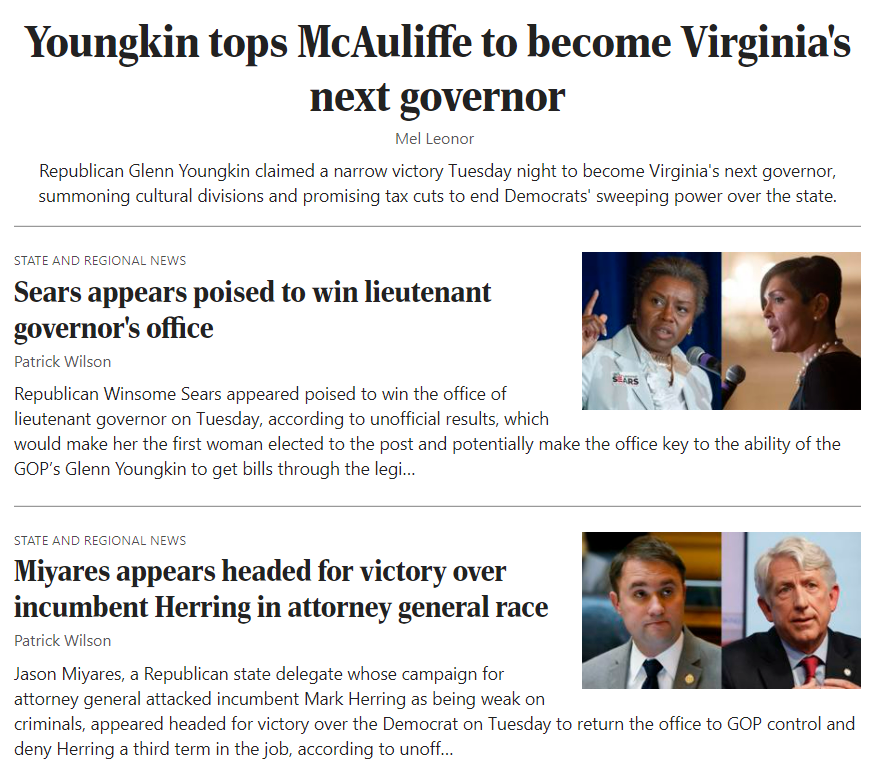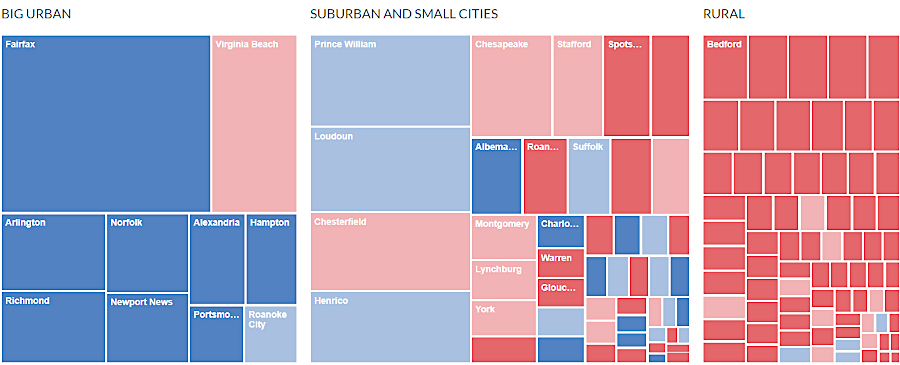
State Sen. Amanda Chase planned to mobilize Trump supporters in her 2021 campaign for governor
Source: State Senator Amanda Chase, Facebook post (November 28, 2020)

State Sen. Amanda Chase planned to mobilize Trump supporters in her 2021 campaign for governor
Source: State Senator Amanda Chase, Facebook post (November 28, 2020)
After the 2020 election in which Joe Biden defeated President Donald Trump by 10% points, the Republican Party elected a new chair and planned for the 2021 elections to turn out differently.
Virginia and New Jersey are the only states to elect governors in the year after a presidential election, and since 1973 typically Virginia flipped. If a Democratic candidate won the presidential election, a Republican won the gubernatorial election the following year - and vice versa. The exception was in 2013. In 2012, President Obama won a second term, capturing Virginia for the second time in the process. A year later, Democratic candidate Terry McAuliffe narrowly defeated Republican candidate Ken Cucinelli.1
The 2021 election also included all 100 seats in the House of Delegates, which the Democrats controlled by a 55-45 majority. After the defeat of President Trump, Virginia's Republican leaders thought "moderate" candidates would have a greater potential for getting elected to statewide offices. Some thought there was a chance of winning enough seats to gain control of the House of Delegates, but Minority Leader Kirk Cox decided to gamble on running for Governor rather than for re-election.
State Sen. Amanda Chase advertised herself as the "Trumpian" candidate for Governor. By repeating his false claims and his rhetoric, she hoped to win the nomination by attracting the vast majority of Trump's supporters while other candidates split the votes of those Republicans less enamored by the former president.
The party leaders did not want to rely in the 2021 race for Governor upon just the base that had supported President Trump in the 2021 campaigns, since he lost by a 10% margin. The Republican State Central Committee structured the process for the 2021 governor's race to limit the potential of State Sen. Amanda Chase becoming the nominee, by choosing to hold a convention rather than a primary.
State Sen. Chase recognized that the party "insiders" would control the convention. They would focus on candidates and policies that might attract suburban voters, rather than support her full-throated advocacy for gun rights and President Trump's agenda. That approach would galvanize rural voters, but would be toxic to educated white women in the suburbs who were viewed as the swing voters.
After the party leadership's decision to hold a convention, Chase announced she would run as an independent. That created the risk of splitting the vote in 2021, limiting the potential for a more-moderate Republican nominee to be elected governor.
The convention used a ranked voting process to select a candidate with majority support. The ranked choice voting process was designed to prevent Chase from winning the nomination with a plurality of supporters. In 2013, tea party champions had filled the Republican Party convention and nominated fireband Ken Cuccinelli, but Cuccinelli became the only Republican candidate to lose the race for Governor when a Democrat was President since 1973.
In the end, State Sen. Chase supported the Republican Party nominee, Glenn Youngkin. She announced after the election that she was running in 2022 for a seat in the US House of Representatives. She had competition; six other Republicans were also running for that seat.
Youngkin, who had not previously held public office, campaigned to attract swing voters rather than to maximize excitement among his conservative supporters. He avoided discussion of abortion or guns as a campaign issue. He recognized that pro-life and pro-gun advocates were not going to vote for the Democratic candidate, so without having to speak out he could count on voters who cared about those issue to vote Republican.
The large number of voters in Northern Virginia and the voter support for Democratic candidates remained a challenge for Republicans trying to win statewide races. In the 2020 presidential race, 32% of all votes in Virginia came from Northern Virginia.
That region continued to grow, adding 350,000 residents from Loudoun to Stafford County between 2010-2020. The 2020 Census revealed that over 50% of the Virginia jurisdictions which voted for Trump in 2020 had lost population in the last decade, while two-thirds of the jurisdictions which voted for Biden had increased population.
The last three Republicans to be elected governor won Northern Virginia - George Allen in 1993, Jim Gilmore in 1997, and Bob McDonnell in 2009. McDonnell won 52% of the Northern Virginia vote in 2009, even though the region had given 60% of its vote to Barack Obama in 2008.
Since 2009, a higher percentage of the region's vote was captured by Democratic candidates. In 2017, Democratic candidate Ralph Northam won 66% of the vote in all jurisdictions north of Stafford County and east of the Blue Ridge, including Loudoun and Prince William counties.
Youngkin's strategists figured they could win statewide in 2021 if they minimized the margin of defeat in Northern Virginia, and if voter turnout was low. If the Republican candidate captured just 40% of the vote in Northern Virginia, while breaking even or winning in other urban areas and getting 70% of the vote in rural areas, he could win. On the Sunday before Election Day, Youngkin toured Southwest Virginia to get out the vote in an area dominated by Republicans, but he campaigned on Saturday in Northern Virginia and scheduled final rallies on Monday in Roanoke, Richmond, and Virginia Beach before finishing that night in Loudoun County.
Democratic candidate Terry McAuliffe sought to energize his supporters and maximize his vote in Northern Virginia by linking Glenn Youngkin to former President Donald Trump, who had been very unpopular in the region. A political strategist for the Democrats commented on the dilemma faced by his rivals:2
Glenn Youngkin highlighted in his campaign how his opponent had declared that parents should not control what was taught in public schools. A Republican pollster described how the 2021 gubernatorial race was focused on the suburbs:3
Former US Congressman Tom Davis noted before the 2021 election:4
In Virginia, rural jurisdictions are reliably Republican and efforts to "turn the Shenandoah Valley blue" have not succeeded. Because the number of voters in urban areas exceeded the number of rural voters, shifts in political power depended upon the ability of candidates to appeal to suburban areas.
In 2021, the Republican Party had a very successful "get out the vote" campaign in the rural areas, and the suburbs tilted towards the Republican candidates. McAuliffe struggled unsuccessfully to tie Youngkin to Trump. Youngkin focused on cultural issues such as parental control of content taught in schools, and recruited Trump supporters without offending moderates. Youngkin won with 51% of the vote, successfully running both as a centrist and as an ally of Trump:5
The Republicans played offense on education. They proposed a $1 billion increase in funding for education to offset expected Democratic claims that the Republicans would cut salaries of school teachers.
The campaign emphasized a quote by McAuliffe that suggested government officials rather than parents should control the material taught in public schools, and that a poitical agenda should advance the cultural wars at the K-12 ages. The removal of Confederate monuments and the discussions of systemic racism had triggered strong emotions. While Fox News and other media warned suburban parents that their children would be used as pawns of "woke" Democrats if McAuliffe won in 2021, Youngkin's campaign focused on a less-divisive issue that parents should be in charge of children and have a say in what was taught in the schools.

one statement by McAuliffe was used effectively by the Youngkin campaign to create the impression that Democrats wanted public schools to indoctrinate children with progressive political philosophy
Source: Glenn Youngkin, Terry McAuliffe says parents should have no say in their child's education
Republican candidates also won the Lieutenant Governor and Attorney General races. By winning the race for Lieutenant Governor, Winsome Earle-Sears became the first black woman elected to statewide office in Virginia, and Republicans gained the tiebreaking vote in a State Senate with a slim 21-19 Democratic majority until the next election in 2023.
The victory of Republican Jason Miyares over Democrat Mark Herring marked the first time an incumbent Attorney General lost a re-election race since the Readjuster incumbent lost to a Democrat in 1885. Republican candidates captured seven House of Delegates races, giving them a 52-48 majority and flipping control of that half of the General Assembly.
Rural voter turnout was higher than expected, and trended even more Republican than in the past. The rural vote was moving towards a reliable bloc focused on identity politics and supporting Democrats, comparable to the high percentage of Democratic support by black voters:6
Predictions of Virginia being a "blue state" proved to be premature; it was a competitive state where Republicans won statewide elections. As the chair of the Republican Party had promised after President Trump was defeated in 2020:7
The timing of the comeback was critical. A key Republican who had served in the House of Delegates said after the 2021 victory that the Republicans "were about to be relegated to third-party status":8
McAuliffe won the suburbs, but Youngkin collected votes from even the urban areas while getting a record number of rural residents to vote. The Democratic enthusiasm in the suburbs had clearly diminished after Trump's defeat in 2020.
Youngkin did not convince Democrats to switch parties and vote Republican, and McAuliffe did not lose because he failed to rally the Democratic voters. Democrats who had voted for Biden in 2020 participated in the 2021 election. In 2021, McAuliffe received the highest number of votes ever cast for a Democratic nominee for governor, 190,652 more than Ralph Northam in 2017. That was nearly 14% more than the number of Democratic votes for governor in 2017.
Youngkin won because he mobilized even more supporters than McAulife. Youngkin collected 487,426 more votes than Ed Gillespie, the Republican candidate in 2017. That was over 41% more than the number of Republican votes for governor in 2017. Bottom Line: a higher number of Republicans cast an absentee ballot or went to the polls on Election Day, Youngkin captured 63,688 more votes than McAuliffe, and the Republican candidate won by 51-49%.
According to Larry Sabato at the University of Virginia, the socio-economic pattern of the voters was different in 2021 compared to just a year earlier when Biden defeated Trump:9
One Democrat in Alexandria commented on the shift in attitude, one year after Virginia gave 55% of its vote to Joe Biden:10

newspaper headlines on November 3, 2021 showed Virginia was a "purple" rather than a "blue" state
Source: Richmond Times-Dispatch (November 3, 2021)
Post-election assessments highlighted how Youngkin had managed to run in parallel with Trump, retaining his endorsement without Youngkin ever being seen together with him. A Saturday Night Live sketch following the election placed Youngkin on a television show with Trump in split-screen, with Youngkin squirming hard to escape the optics of direct association with the former president.
Political strategists for Youngkin emphasized how they focused throughout the campaign on local and state rather than national issues. They thought Terry McAuliffe was a national Democrat, former head of the Democratic National Committee (DNC), who emphasized progressive issues that resonated in New York and California but were unpopular with suburban voters in Virginia.
The Republican strategy was to appeal to voters who did not want to "defund" the police or remove resource officers from schools, and to claim that the Democrats were trying to force schools to teach "critical race theory." As a candidate with no political track record, Youngkin's campaign was designed from the beginning of the nomination race to gain support of swing votes in the suburbs, obscuring any relationship with Donald Trump while simultaneously stimulating a strong turnout in rural areas where his support was strong:11
McAuliffe was closely identified with the national Democratic Party, and President Biden's approval rating dropped into the low 40's after the chaotic withdrawl from Afghanistan in August. Throughout the Virginia campaigns for nomination and then election in 2021, the US Congress and President Biden were engaged in fractious discussions about two major legislative initiatives. The Democrats were not described by the media as problem-solvers; news stories highlighted the disagreements and inability to decide. One of the two bills passed a week after the November election, but by that time it was too late for McAuliffe to associate himself with success.
The Democratic campaign tried to generate support on multiple issues. A Republican strategist identified how McAuliffe could have won, particularly by regaining control of the education issue through accusations that Republican plans to cut taxes would require firing teachers and reducing the quality of school programming.
The Democrats treated the 2021 Virginia election as an ideological national campaign where party labels were most important, and negative ads about Trump would sink Youngkin's chances. The Republicans realized that while many voters cared about whatever Trump and Biden were doing, and already-committed voters were watching Fox News or CNN, a substantial block was paying attention primarily to local news and would repond to positive ads about the candidate's vision.
Youngkin was a newcomer without the baggage of previous campaign statements, high-profile votes, or endorsements of controversial candidates. His campaign maintained enough of a connection to Trump to retain his ideologically-driven voters. It helped that McAuliffe's advertising constantly emphasized Trump's endorsement and the pro-life, pro-gun stance of the Republican Party, reinforcing conservative support for Youngkin and energizing those voters.
Youngkin was also well-funded. He contributed $20 million from his own personal wealth to the 2021 campaign, and raised a total of $68 million compared to McAuliffe's $69 million. In November, 75% of Virginia's rural voters chose the Republican candidate, a percentage comparable to "Saddam Hussein-type of numbers."

in 2021, Youngkin won nearly every "rural" county (with a population density of fewer than 125 people per square mile)
Source: Virginia Public Access Project (VPAP), 2021 Governor
However, Youngkin's advertising and campaign events targeted voters who might be willing to consider splitting their ticket or switching parties based on state-oriented issues and local concerns.
On election day, McAuliffe had 11 separate commercials on television while Youngkin had only three. McAuliffe could have adopted a more-narrow focus, and emphasized the same issues that mobilized enough suburban parents to vote Republican instead. The Republican strategist was not impressed favorably by the Democratic approach:12
On his first day in office, Gov.Youngkin issued nine executive orders and two executive directives. One rescinded the COVID-19 vaccine mandate for all state employees, and another rescinded the statewide mask mandate for public school students.13
The 2021 election made a difference, with a Republican governor setting new policies into motion starting January 15, 2022.
However, the new governor's promise to withdraw Virginia from the Regional Greenhouse Gas Initiative (RGGI) on his first day ran into difficulty. The outgoing Democratic Attorney General had issued an opinion that the governor lacked authority to do so. The General Assembly had passed a law to join the multi-state initiative, and no executive action could repeal that existing law.
Governor Youngkin proposed in Executive Order #9 that the State Air Pollution Control Board should prepare an emergency regulation to pull Virginia out of the Regional Greenhouse Gas Initiative. The new governor anticipated repealing the regulation rather the underlying law, a process which would still trigger Virginia's withdrawal.
Supporters of the Regional Greenhouse Gas Initiative argued that the governor's interpretation was incorrect, though the law itself authorized rather than mandated Virginia's participation. An attorney with the Southern Environmental Law Center commented that trying to use a regulatory part of the Executive Branch to repeal a law passed by the legislature and signed by the previous governor would still violate the separation of the branches of government enshrined in the Constitution of Virginia since 1776:14
In addition, Virginia's state government was still divided between the parties after the 2021 election. The State Senate remained under control of the Democrats, and they blocked efforts by Republicans to roll back legislation passed over the last two years when Democrats controlled the House of Delegates and the Goverbor's office.
Republicans in the State Senate proposed bills in 2022 to impose restrictions on voting, including a requirement to show an identification card with a photo at the polls and a ban on same-day voter registration. The Privileges and Elections Committee in the State Senate, with a 9-6 majority of Democratic members, rejected the Republican effort to undo the expansion of voting rights passed over the last two years. In the State Senate Commerce and Labor Committee, Democrats blocked efforts to block scheduled increases in the state's minimum wage.15
The balance of power tilted after the 2021 election, but the Republican comeback did not give that party the option of steamrolling the Democrats. The two parties had to find ways to compromise in order to pass legislation through both houses of the General Assembly, and the Governor still had to negotiate with the legislative branch to advance his agenda.